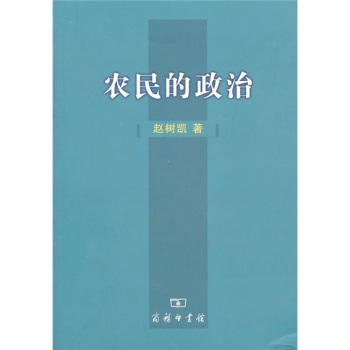The Farmers' Politics
Aug 16,2014
Zhao Shukai. The Farmer's Politics. Beijing: Commercial Press, May 2011 and May 2012

Viewing Farmers' Politics from No. 9 Courtyard -- An Introduction to The Farmers' Politics
(The author once worked in No. 9 Courtyard in Beijing- note added by the translator)
In view of China's rural policy, either before or after the reform, it has always been focused on farmers' interests as well as on the goal of seeking farmers' happiness. However, the historical paths and current situation of rural development have revealed that the same starting point of policy often lead to widely divergent policy designing. Even today, a lot of institutional arrangements have good intentions, yet, the results are often counterproductive, even degenerated into bad governance doing harm to farmers. It is quite difficult to give an explanation to this phenomenon. The intention to probe into this problem is the underlying reason to write the book The Farmers' Politics.
In recent years, I have tried to make some explorations on the relationship between farmers and policies in the reform process. In my view the general reason for the deviation between political intentions and institutional arrangements, and the difference between policy objectives and policy outcomes lies in the fact that in the pattern of political rights, the farmers, as the largest social class, lack of a due position. Farmers' falling into the political predicament can be attributed to the phenomenon that the farmers themselves, as a political force, have not truly got involved in the political life of the country.
This book has five parts composed of 28 chapters, which are summarized and refined from the author's life and work experience. Overall, the writing style is relaxed and vivid, and the themes, genres and narrative styles in various parts and chapters boast distinct characteristics.
Part One: Observations on high-level policy-making process. This part has four chapters and the content is based on the author' work experience in the 1980s and 1990s. During that period, the rural policy research was mainly carried out in No. 9 Courtyard in Beijing. These articles try to observe the certain internal logic in the high-level policy-making process from a particular point of view and discuss, in light of some characters and events, what politics mean and what is the relationship between farmers and politics.
Part Two: Grassroots government reform experience. The two years' working experience at the primary level had enabled the author, together with other leading members, to get involved in the county and municipal-level reform. The six chapters in this part illustrate, through the author's day-to-day work, the process, focus, motivation and objective relating to grassroots government reform.
Part Three: Reading notes on democracy at the grassroots level. To prepare a lesson for members of the Political Bureau of CPC Central Committee on democracy at the grassroots level, the author concentrated all his efforts on collecting materials and making field surveys at the primary level. The author put what he had learned from books during his preparation into words combined with his personal experience, all of which constitute the main content of this part. This part has eight chapters, which focused on the development of grassroots democracy in China and discuss a series of issues, including Party and government organizations at the primary level, NGOs, the construction of democracy and legal system, democracy and social stability as well as the international factors affecting democratic process.
Part Four: My understanding of village governance. I went to some selected villages and had a hand in the village affairs such as organizing some village infrastructure construction, restoring public order and addressing some contractions between village leaders and villagers. Some of my experience was quite interesting and I noted them down and had them grouped into six chapters.
Part Five: My knowledge gained from research on farmers' issues. This part has six chapters. With regard to research on rural policy and farmers' issues, it is important to apply an appropriate historical perspective since history could make one become sober-headed and wise. In the past 30 years' reform, I have witnessed a number of incidents in rural areas such as farmers' complaints made through letters and visits and farmers' migration moving away from agriculture, which have given me a lot of inspirations. Besides, I am also much benefited from the evolvement of theoretic approaches relating to Western academic development, especially the research findings by Western scholars on the contradictions in China's rural areas.
To some extent, the introduction is aimed at giving a systematic explanation of the author's ideas on farmers and politics in China, or rather sheding light on the author's confusions toward some baffling problems, such as in modern China, what is farmers' political attribute, what role farmers could play in politics, how to express farmers' political capability and what is the relation between political system and farmers and etc.
The relationship between farmers and politics is both a lower-level and a higher-level issue and both a practical problem and one of academic concern. These problems could find expression not only in rural areas but also in government administration.
In the future development of China's politics, no answer could be given at present as regards what role farmers will play or in other words what is the farmers' political future and what is the trend of China's political evolvement. Maybe social development is not unpredictable, and basically speaking history will mock on those who think they have found out the abstruse secret of history. No one could grasp the rule and logic of the evolvement of history and no one could design, shape, or grasp the goals and directions of social development. However, this does not mean one should give up research and exploration. It is in the perplexity of history that exist the meaning and value of research. It is a great historical task to do some research on the relationship between China's farmers and China's politics. The research itself brings one both confusion and pleasure.














